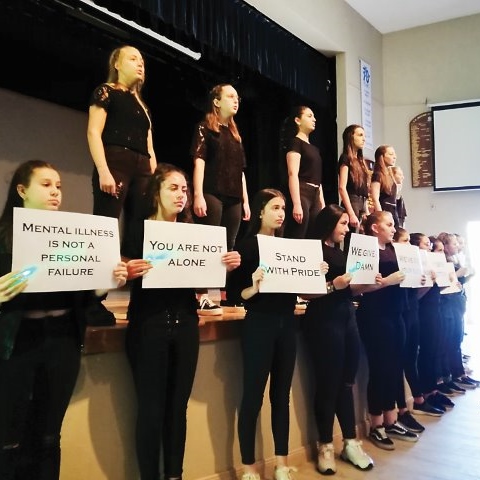
SA

Seef tribute places spotlight on mental illness
JORDAN MOSHE
“At that moment, the hysteria stopped,” recounts Wolpe. “My vision blurred. My mind went silent. I was no longer present. No longer a part of the world. And when I finally did return to the world, it wasn’t the same. It was suddenly a more empty, hollow place. It was frightening.”
He was one of several speakers who addressed an audience at King David Linksfield High School on Friday at a unique assembly devoted to raising awareness of mental health. Accounts, dances, songs, and more were shared on stage not only to pay tribute to Seef’s memory, but to draw lessons from his death for those who suffer from mental health issues.
Adam Seef took his life while on holiday with his best friends in Israel shortly after his 19th birthday. A first-year medical student at the University of the Witwatersrand, he struggled with issues of identity, anxiety, and depression.
Said Wolpe, “Chester Bennington. Robin Williams. Marilyn Monroe. Avicii. Adam Seef. These people didn’t commit suicide. They were killed by it. These people didn’t take their own lives. They were taken from them. Depression isn’t a choice. It’s an insidious, debilitating sickness. And it doesn’t discriminate.
“When depression infects a piece of your mind, it grips your rationality. Distorts it. A cloud of black covers your neural vision. ‘For sures’ become ‘what ifs’, and reaching out for help seems more like a death sentence than a cure.”
Even those who appear successful and happy on the outside can harbour dark feelings inside, said Jodi Seef, Adam’s mother. She said her son had been a top academic achiever, possessed of sharp sense of humour, and adored by his family and friends. Yet in spite of all this, he was never good enough in his own eyes.
“In his own mind, Adam was never good enough, not handsome enough, and just not enough. He was caught up in a vortex of hopelessness, and hated himself and who he was. Adam lived in absolute darkness […] and could never accept his unique differences.”
In her son’s memory, Seef declared that it was time to “start giving a damn” by recognising others’ mental challenges, and reaching out to them. “No matter who you are and what your challenges are, you are worthy of life and love. We are all good enough to be here, and are all loved by Hashem unconditionally. A good person is a good person, and it’s okay not to be okay,” she said.
Seef stressed that parents and educators must reach out to our community’s youngsters, building them up from a young age, and helping them to shape their self-esteem and confidence. “Don’t let them collapse under the unbearable weight of low self-esteem,” she said.
Other tributes to Adam and acknowledgements of the battle he fought included a performance of Why Can’t I Be Me?, a moving song composed and performed by student Tanna Levick. Introducing the song, fellow student Brad Gottschalk explained that Adam seemed to be most himself when he was on stage, and music was a medium with which he resonated.
“I’m not going to pretend I knew Adam personally, because I didn’t,” said Gottschalk. “Most of us never knew him personally. But, if you have ever opted out of doing something you love because of what others think, you know Adam.
“If you wear a mask, and every day is a battle to be fought, you know Adam. If you are struggling with your identity or sexuality, you know Adam. If the future feels uncertain and unclear, you know Adam. If you are on the outside looking in, you know Adam. If you are ‘the other’ or don’t fit into the mould, you know Adam. We all know Adam.”
The assembly was held in the midst of mental health awareness week, dedicated to talking about mental illness, and acknowledging that mental health is just as important as physical health. Starting last Wednesday, the school’s awareness committee devoted each day to a different mental health issue such as anxiety, self-image, depression, and autism, each of which was grappled with through various activities at the school. Journalling expert and empowerment coach Claire Holden also addressed the audience, outlining the constructive benefits of journalling in understanding the self.
“Mental illness is not something you can ‘just get over’,” said students Chad Silver and Samara Jay. “Acknowledging that it shouldn’t be invisible is extremely important. If you could see an invisible illness like you could see a broken bone, no one would ever be called weak for fighting.”
Wolpe said that he and a small group of individuals close to Adam were building a website that would have two main sections: Adam’s wall and Adam’s forum. The former will allow people to post memories, thoughts, and experiences directed at Adam, while the latter will be an anonymous community chatroom for sharing personal thoughts and experiences. Both will go live later this year.
Said Wolpe, “Adam didn’t feel that he could reconcile his inner feelings with the identity he built. Here, you are free of that burden. Our goal is not to seek and assist. We are offering a community of people and professionals who have either studied what you are going through, or have gone through it themselves.
“It doesn’t matter if you are male or female, old or young, gay or straight, an atheist or a believer, self-loathing or self-loving. Because before all of that, you are human. You are part of Adam’s community. We want to give you the tools to reach out, and to be part of something powerful.”




